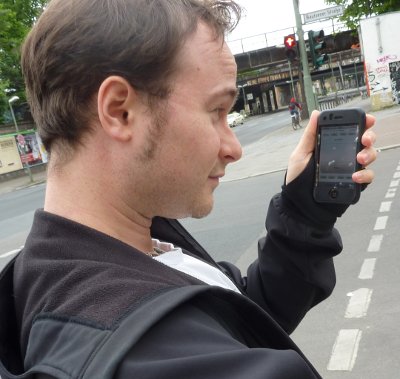How to learn a foreign language without spending a cent
Wouldn't it be great if you could effortlessly communicate in another language? For many people, this seems like a pipe dream. We aren't going to wake up one day (Ã la Jason Bourne) suddenly fluent in a bunch of languages, and we can't download them into our brain instantaneously like they do in The Matrix. Such dramatic changes aren't possible.

However, it is possible for the average adult to learn to speak a foreign language confidently in a relatively short time.
I'm sure you've met people who have managed to learn a foreign language, either by growing up with it or learning it as an adult. The only problem is that we tend to think they had resources we didn't have: time, talent, and (above all) money. Surely it must have cost a small fortune for the courses they took, the software they bought, and the time abroad to study. It all seems out of reach for those of us on a budget.
Today I'm here to tell you that money has nothing to do with learning a language. In this article, I'll give you several steps to learn your target language and reach a good spoken level — maybe even fluency — without spending a cent.
It's time to start language hacking!
Finding the Right Mindset
I've been learning languages for about eight years, and can indeed speak several fluently now. I typically socialize and live my life almost entirely without using any English, depending on where I am and who I'm with.
However, at age 21 I could only speak English and had poor academic results in German from school. Learning a language seemed impossible.
- I didn't have the right “genes”.
- I had to work full-time so I simply couldn't spend all day studying.
- I have a terrible memory for simple information.
- I was too old (I heard from somewhere that 14 or something was a critical age limit for learning a second language, but it turns out this rumor is totally unfounded).
- I had just graduated in engineering — “you're either good at Mathematics/Physics or you're good at Art/Languages” I told myself.
I was so sure of all of this that I managed to spend six months living in Spain without learning to speak any Spanish!
But then one day I had a Eureka! moment. I realized what had been holding me back all this time: My devotion to the excuses, not the excuses themselves. It was a fear to speak, a fear of ridicule, a fear of annoying natives, a fear of making mistakes and looking stupid.
Only fear kept me from learning to speak another language.
In meeting thousands of language learners over the last decade I can confirm that fear is why they aren't speaking — the actual excuses they give are what they lean on to justify that fear. But it's unfounded.

After living in dozens of countries, I can tell you that most people across the planet have no interest in making fun of your attempts to learn their language. First, they're generally thrilled that an English speaker is even trying to speak their language. And second, very few people are that malicious. When you try your best to speak to a person in their native language, they appreciate it. People's focus is always on understanding and communicating, never ridiculing someone willing to try.
So, my top tip to learning a language is to deal with your fears. This is a psychological barrier, not a monetary or genetic or intelligence problem. Apply some of the other tips in this article, and try to use your new language at every opportunity. By doing this you'll see that all your fears are unfounded and even when you are speaking with just the basics, you can indeed do a lot! Each time you try, the fear starts to seem more illogical until it vanishes.
Learn the Essentials
Too many people who have a real desire to use a language get caught up in the learning stage and stay stuck there indefinitely. Too many of us are perfectionists, so we feel that you need to know all of the grammar and all of the vocabulary before you can “bother” a native with your stumbles.
So they get the biggest, fattest courses they can find. Perhaps that's expensive software, which in my opinion actually leaves a lot to be desired, (as you can see in my frank Rosetta Stone review) or maybe it's signing up to a classroom-style course. These systems use a ground-level-up approach of trying to teach you everything, and in doing so tend to teach you nothing that you can use right now.
All you really need to get started is a vague understanding of how the language works and some key phrases and essential vocabulary.
There are many completely free resources for getting these basics. A few of my favorite include:
- Your local library for a book-based mini-course. I actually find these to be fine in many cases.

- If you feel you are finding it hard to memorize words, I have personally found that applying image association and sound association can be very effective to make sure you don't forget them. It takes some getting used to, but after a few tries it becomes second nature to learn vocabulary quicker this way. Also keep in mind that they are not all entirely new words. There are thousands of words you know already, especially in European languages.
- Go through completely free online courses. Listing them here would be quite complicated, but one site that has done an excellent job of linking to some of the best online is Omniglot. Find your language in the list and scroll down to the bottom of its summary page to see the course links. Note that several will be (affiliate) links to paid products — you can get all the essentials you need from the free ones, such as BBC's and about.com's language overviews.
- When you aren't sure of a particular word, no need to have bought a dictionary! Google Translate can help to give you the basic gist (I wouldn't recommend it for anything serious) and wordreference.com and other websites (depending on the language) have extensive free dictionaries for individual words with proper context explanations.
- This may sound counter-intuitive, but I actually find that going through the shortest course is best when starting off. You just want an overview of the language — not the start of a very long and endless journey to find out everything about it. So after reading through and studying one of these online courses for just a few hours, and learning key basic vocabulary, focus entirely on learning phrases. Many of the courses linked to have some essential phrases included, but I actually find that learning a different set called conversational connectors can help you maintain the flow quicker in real conversations.
With just this handful of free tools, you can start learning the basics of your chosen language today.
Find People And Start Speaking the Language Immediately

Studying indefinitely is a waste of time in this respect. The purpose of studying should be to improve what you're already saying, not to prepare to speak some day. (There are seven days in a week and “some day” is not one of them.)
The communicative approach of language learning involves using it naturally as much as possible and doing so immediately. Studying is a minor part of what you should really be doing. What you should really be doing is speaking the language naturally. And no, you don't have to fly to the country to do this!
First, see if you can meet up in person to practice your language. This is a powerful way to make a language a truly natural part of your social calendar and life. Here are several ways I've been able to make this happen:
- Find a group that meets to practice the language on meetup.com — they can be very active in some cities for particular languages! There are many other learners here, as well as friendly natives in many cases. Nobody will ever judge you as they understand what you're going through.
- Use Couchsurfing. This site is famous as a way for budget travelers to save money by sleeping on other people's couches. While couchsurfing with natives abroad can be a great way to learn a language, traveling may not be possible for you right now, but that's okay! Enter the site, sign up for a profile and attend the meetings that occur regularly in cities, perhaps including your home town. It's possible a native is passing through. But even better than this is to go to the Couchsurf page and only select your home city and your target language among search criteria. You'll be very surprised to see how many open minded people who speak the language fluently or as natives live just around the corner! Message them and invite them out for coffee.
- Depending on who you know, you may be able to meet up with family members or friends who speak the language. They'll certainly be willing to help you practice! But otherwise be sure to ask in your local community: reading clubs, churches, sports clubs, classmates, work colleagues etc. You may be surprised to see that someone there speaks your language and would love to help out!
If you live in any major city you will find natives and fluent speakers of most languages if you look hard enough. They are definitely there! If you're really stuck, or live too far from such cities, there's another option: online (Skype-based) conversation!
There are many sites that you can use to find someone who actually wants to learn English who you can help, while they teach you their language. My own website, for example, has a forum section where plenty of people post the combination they are looking to exchange and many are finding a conversation exchange!
Other sites that can help include Livemocha and Busuu. These actually have paid course aspects that I really don't recommend to people, but their social connections to find native speakers are great and free!
Be Imaginative, Confident and Let the Conversations Flow!
So you've got the basics, found someone to speak to, and decided to put your excuses aside and attempt to enjoy the experience. There's still something missing though — what do you talk about when you've learned so little?
This is actually much easier than people think. A few weeks into learning languages I can have dozens of conversations, and it's because I try to use my imagination (no, I don't talk about the weather), try to be charming to balance out any minor slip-ups I'm making or simply laugh at them as not a big deal, and listen to the other person.
If you're worried that you won't be interesting enough for the other person, it's important to realize that sometimes to be interesting you have to be interested. Being a good listener will have the other person appreciate your company all the more, and with time you will be saying more and more.
I discuss many other aspects of how to get into this flow of imaginatively in initial stages in a conversation on my blog and summarize my favorite tricks in this video.
As complicated as it seems, when you let go of your hang-ups then you may discover that you had the ability to speak all along, as my friend Geraldine showed me by speaking in Spanish all evening the first time she tried.
Rather than being a genius and needing to perform advanced grammatical calculations, to really speak a language you have to actually learn to stop thinking so much, learn enough to say something first, let go of your ego, make a few mistakes and just let conversations flow!
No credit cards or wads of cash are necessary for this.
Give it a try — with enough practice you will improve so quickly that soon you'll start to wonder if you really couldn't speak the language before!
Become A Money Boss And Join 15,000 Others
Subscribe to the GRS Insider (FREE) and we’ll give you a copy of the Money Boss Manifesto (also FREE)

